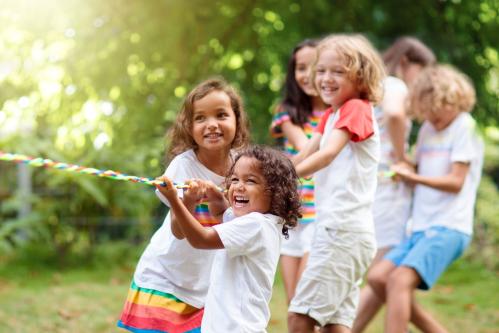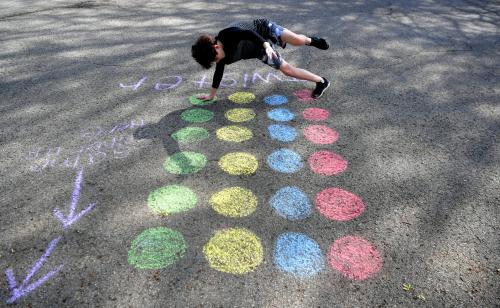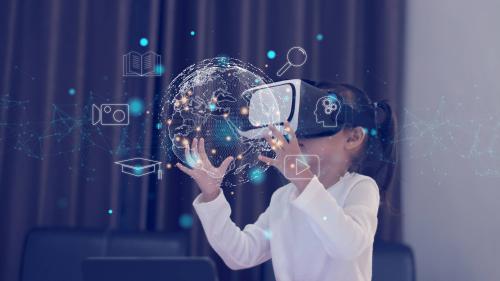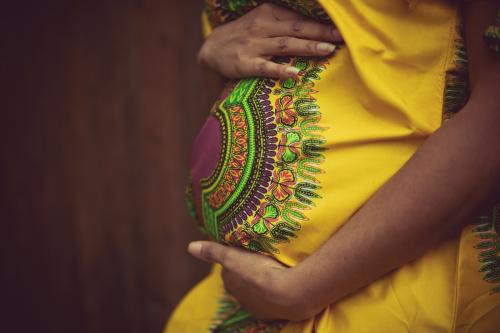Play is not a luxury. Play is a necessity.
Kay Redfield Jamison
Crisis contexts, whether due to conflict, economic or political upheaval, climate change or natural hazards, impact young children in myriad ways. They can displace children from their homes, cut off access to education, health, nutritious food, and other services, and impact them psychologically and emotionally. Play in these contexts becomes even more important as it enables young children to repair the fractures of their protective environment, reestablish relationships and routines, decrease stress, and pave the way for learning to continue. That learning goes beyond academic skills of reading, writing, and math. Learning through play enables children to practice and develop critical breadth of skills such as empathy, collaboration, problem-solving, negotiation, and more that they need to thrive and contribute positively to the world.
While investment and programming to support young children in crisis have increased, humanitarian funding to education and child protection, two sectors that dominate support for young children in emergencies is regularly around 2-3% of all humanitarian funding. When all sectoral humanitarian funding was analyzed in 2018, only about 2% of all funding explicitly mentioned early childhood development in emergencies. Mindsets of those that make decisions about children’s futures—governments, donors, community leaders, teachers, parents, and caregivers—still need to shift to place more value on play in all contexts, but particularly in humanitarian emergencies. A recent study across 36 countries showed that 78% of children say adults do not always think playing is important. Further, 73% of children do not believe adults take play to help them seriously.
While research on young children in humanitarian crisis is still growing and has a long way to go, three key elements in learning and healing through play in humanitarian contexts have emerged that are distinct from (though relevant to) nonhumanitarian contexts.
1. Emphasis on psychosocial well-being
Emergencies can increase stress due to disrupted daily routines, fracturing or weakening of social support networks, and separation from trusted family members. The World Health Organization found that most people in humanitarian situations experience elevated levels of stress with about 1 in 5 experiencing diagnosable psychological ailments such as depression and post-traumatic stress disorder. Research on the impact of climate change on children indicates an increased risk of developing phobias, sleep disorders, and longer-term adverse mental health outcomes. When multiple adversities pile up, which often happens in humanitarian contexts, stress can become toxic and have longer-term negative mental and physical health consequences.
Learn to Play Botswana, working in Dukwi refugee camp, developed a Mindful Play curriculum that was implemented in center-based and home-based play groups. The curriculum integrates playful mindfulness practice such as deep breathing, positive affirmations, and gratitude reflections. This approach helps children and families develop crucial skills such as self-regulation, empathy, and resilience, and promotes healthy, loving relationships. This approach showed a 33% improvement in social and emotional development milestones, increased creativity and imagination, and school readiness.
I am thankful for the exposure that Learn to Play has provided me with activities like yoga and mindfulness as they offer numerous benefits to both parents and children. Yoga offers emotional regulation to us parents and children. We can manage our emotions effectively, leading to reduced stress, anxiety, and behavioral issues.
Parent in Bontleng, Botswana
BRAC, a Bangladesh-born organization, adapted its Play Lab model for humanitarian contexts, including Rohingya refugees in Bangladesh and South Sudanese refugees in Uganda, that has a stronger emphasis on psychosocial well-being. Research on and evaluations of Play Labs and Humanitarian Play Labs have shown positive impacts on children’s learning, healing, and development. For example, the Ages and Stages Questionnaire—a common assessment tool measuring children’s physical, intellectual, and socioemotional development—showed significant differences between Play Lab children and control children in all areas. Other research revealed positive impacts on children’s and parents/caregivers’ psychosocial well-being. In addition to Humanitarian Play Labs, BRAC piloted a Para-counselor model in Rohingya refugee camp that equipped women (called Sisters of Peace) with knowledge and skills to provide basic 1-to-1 psychosocial support, like Psychological First Aid, for families in need. A qualitative process evaluation of the Sisters of Peace model showed positive outcomes on child and family psychosocial well-being.
2. Mobile learning through play approaches
As many people are displaced from their homes due to humanitarian crises, mobile approaches to learning and healing through play increase access to support as they take services to people where they are.
In Colombia, AeiouTU, a Colombian social enterprise, the International Rescue Committee Colombia, and Juego y Niñez developed “traveling backpacks” to support Venezuelan and other migrants either staying in or passing through Colombia. The “traveling backpacks” were designed for children and families and with teachers. The backpacks include easy to carry learning and play materials for families and for teachers that support the continuation of healing and learning no matter if the child is in a formal space or on the move.
The backpack was very useful here in Cartagena, given the itinerant nature of the project. We had to go out to care for the children in their homes, and the backpack was essential in this sense...[I]t allowed us to carry all the essential tools that we always needed...
Niosca Colina, AeioTU-trained Early Childhood Development teacher
During Typhoon Haiyan in the Philippines and the 2015 earthquake in Nepal, Plan Philippines and Plan Nepal also developed mobile approaches. In the Philippines, Plan developed the Big Blue Bag which provided waterproof play and learning materials that teachers could take to children’s homes or emergency shelters. As there was so much rubble and little space to set up child-friendly Spaces, the Big Blue Bag enabled healing and play to continue. In Nepal, Plan’s multisectoral mobile teams walked from village to village carrying essential play and learning materials to ensure children’s protection, education, and psychosocial well-being continued even after many of their homes were destroyed by the earthquake.
3. Remote learning and healing
While mobile backpacks bring play and learning materials to children and their families, teacher-led remote instruction—which often includes playful approaches—also shows promise for hard-to-reach children, including those in humanitarian and nonhumanitarian contexts. Radio-based learning and interactive audio instruction was tested during the Ebola and COVID-19 pandemics in multiple countries—including Mali, Zambia, and Sierra Leone—while smart phones, WhatsApp, children’s television shows, and other tools showed promise during the multicrisis of COVID-19 and existing refugee or displacement contexts for children and families in Lebanon, Jordan, Bangladesh, and more.
A randomized controlled trial that focused on Syrian refugees and host communities in Lebanon revealed that an 11-week remote early learning program delivered alone and in combination with a parenting program called Ahlan Simsim Families, had significant impacts on children’s learning through play and healing.
In Mali and Zambia, interactive audio instruction, which delivers playful educational content through radios, mobile phones, and CDs, proved effective during the COVID-19 crisis. The audio content is accompanied by an early childhood teacher or group facilitator that is coached by a recorded “teacher facilitator.” The group facilitator implements active child-centered instruction that is relevant to young children’s daily lives. The participatory nature of the guided lessons enables young children to learn through play and has shown positive educational and psychosocial well-being outcomes.
While data on how much remote approaches provide sufficient opportunities for young children to learn through play is still limited, they have shown benefits in increasing knowledge, decreasing stress and creating social support networks among adults (parents/caregivers and early childhood educators).
Humanitarian crises, whether due to conflict, political and economic challenges, or climate change, have spurred unexpected innovations like deeper inclusion of psychosocial well-being, mobile approaches, and remote learning. These contexts show that play is not only a powerful educational tool, but one that provides opportunities to heal from humanitarian crises.
-
Acknowledgements and disclosures
The Brookings Institution is a nonprofit organization based in Washington, D.C. Our mission is to conduct in-depth, nonpartisan research to improve policy and governance at local, national, and global levels. The conclusions and recommendations of any Brookings publication are solely those of its author(s), and do not reflect the views or policies of the Institution, its management, its other scholars, or the funders mentioned below.
The LEGO Foundation is a donor to the Brookings Institution. Brookings recognizes that the value it provides is in the absolute commitment to quality, independence, and impact. The findings, interpretations, and conclusions in this report are not influenced by any donation.





Commentary
Learning and healing through play in humanitarian crises
June 20, 2024